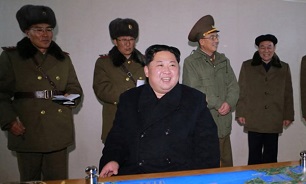North Korea Warns Against Resumption of US-South Korea Military Drills After Olympics
 Whenever joint military drills took place, “the peace and security of the Korean peninsula were gravely threatened and the inter-Korean mistrust and confrontation reached the top, thus creating great difficulties and obstacles ahead of hard-won dialogues,” according to the letter, penned by North Korean Foreign Minister Ri Yong-ho, media reported on Friday.
Whenever joint military drills took place, “the peace and security of the Korean peninsula were gravely threatened and the inter-Korean mistrust and confrontation reached the top, thus creating great difficulties and obstacles ahead of hard-won dialogues,” according to the letter, penned by North Korean Foreign Minister Ri Yong-ho, media reported on Friday.
“We will make every effort to improve inter-Korean relations in future, too, but never sit idle with regard to sinister act of throwing a wet blanket over our efforts,” he said.
Washington and Seoul earlier agreed to delay their annual joint war games in the region until after South Korea hosts the Pyeongchang Winter Olympics, which will start next week.
Ri further added that in the letter that Washington was “misleading” public opinion by claiming that its tough stance against the North was responsible for bringing about the inter-Korean talks.
“The fact that a dramatic turning point has been made for peace and stability, national reconciliation and cooperation, and reunification on the Korean Peninsula where a touch-and-go war danger was prevailing is entirely thanks to the noble love for the nation by respected Comrade Kim Jong-un,” he stressed in the letter, referring to the North Korean leader.
Meanwhile, North Korea’s state media said in a Friday commentary that the US was attempting to create a “stage of confrontation” at the Olympics, adding that inter-Korean talks and the positive results stemming from them could “disappear” following the Games.
It also slammed a pending visit to the Pyeongchang Olympics by US Vice President Mike Pence, accusing Washington of halting improvements in inter-Korean ties.
Last month, a White House official said Pence planned to use his attendance at the Winter Olympics to try to counter what he regarded as North Korean leader Kim’s effort to “hijack” the games with a propaganda campaign.
North Korea has also condemned the latest sanctions imposed by the United States against Pyongyang, calling them an attempt at sabotaging a nascent process of dialog with South Korea.
The first signs of thaw were seen in relations between Pyongyang and Seoul, as representatives from North and South Koreas began direct talks in early January, in the first instance of face-to-face dialog in more than two years at the Peace House in the Joint Security Area in the truce village of Panmunjom, at the demilitarized zone (DMZ) between the divided countries.
Seoul and Pyongyang have agreed on the North Korean team’s participation in the Olympic Games, while North and South Korea will march together under a unified Korean flag for the opening ceremony of the 2018 Winter Olympics in PyeongChang next month.
Pyongyang has firmly defended its military program as a deterrent against the hostile policies of the US and its regional allies, including South Korea and Japan. North Korean officials have time and again accused their American counterparts of seeking regime change in their country.
Washington’s decades-long military presence in and around the Korean Peninsula has forced Pyongyang to develop its ballistic missiles and nuclear weapons as a deterrent against Washington's aggression.
Washington, Tokyo and Seoul have also held a series of high-profile war games near the Korean Peninsula over the past months, amid an ongoing standoff over Pyongyang's development of ballistic missiles and nuclear warheads, as both South Korea and Japan – despite tense relations amid disputes over history and territory – are allies and look to the US for their security.
The United States has thousands of troops in the region, partially in South Korea and Japan, and routinely threatens the North with military action to stop its weapons program.
